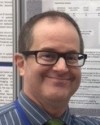NSF, NIH Grants Awarded to Faculty to Support Research and Experiences for Students
Several members of the Trinity College faculty recently were awarded substantial grants to pursue long-term scientific projects alongside their students.
Associate Professor of Psychology Michael A. Grubb has received a Faculty Early Career Development (CAREER) grant from the National Science Foundation (NSF). In addition, Vernon D. Roosa Professor of Applied Science Susan A. Masino and Research Associate Professor David N. Ruskin have received a National Institutes of Health (NIH) R15 Academic Research Enhancement Award (AREA) that also includes collaboration with Associate Professor of Neuroscience Luis A. Martinez.
National Science Foundation grant
Grubb’s five-year NSF grant of $470,000 supports his research on reward learning, selection history, and attentional control.

“This project advances our scientific understanding of how an observer’s past modulates their attention in the present,” Grubb said. “The educational objective is to develop, deliver, and refine a unique set of educational opportunities: 1) create a data-focused lab course to accompany my undergraduate seminar on selective attention, 2) formalize my approach to teaching programming in my research lab by creating a mentoring program wherein older students in the lab teach younger students, and 3) start a campus chapter of Out in Science, Technology, Engineering, and Mathematics (oSTEM) to promote LGBTQ visibility and inclusive mentoring in the service of retaining LGBTQ students in science.”
Grubb said that his long-term research goal is to advance understanding of the external, internal, and developmental factors that determine the focus of attentional prioritization in any moment, so as to better understand the role that attention plays in perception, action, and cognition. Using behavioral, eye-tracking, and neuroimaging methods, “the research objective for this grant is to test two hypotheses concerning selection history, the reflexive prioritization of previously attended items,” Grubb said.
The CAREER Program offers the NSF’s most prestigious awards in support of early-career faculty who have the potential to serve as academic role models in research and education and to lead advances in the mission of their department or organization. “I wanted to apply because the program requires a focus on both research and education, and really trying to link the two in a meaningful way,” Grubb added. “It’s a tremendous opportunity—five years to pursue my research ideas, and even better, to go on that scientific journey with my students. I have a wonderful group of undergraduate collaborators who work in my lab, and I am very excited for all that this grant will provide us.”
In the 2022-23 academic year, Grubb will be a Teaching Fellow in Trinity’s Center for Teaching and Learning (CTL). This yearlong program supports teachers who wish to undertake a project of innovation in their teaching and be part of an ongoing conversation about pedagogy. “I will focus on the development of a lab course to accompany my attention seminar,” Grubb said. “I will deliver the course annually, making refinements in line with feedback from a formal, end-of-term assessment that I will develop as part of the CTL project.”
National Institutes of Health grant
The three-year NIH grant of $459,000 awarded to Masino and Ruskin will fund their continuing their research on metabolic therapy, this time to modulate brain dopaminergic systems.

“We’ve had a long-running research program testing the relationship between the neuromodulator adenosine and very low carbohydrate diets,” Masino said. “Our initial emphasis was on basic neurobiology, and on epilepsy, autism, and pain, but from the beginning we knew that there are clear interactions between adenosine and dopamine systems in the brain. This grant proposes to test the hypothesis directly that metabolic therapy with very low carbohydrate diets modulates dopamine-related processes. Dopamine is a neurotransmitter involved in many behaviors, and also in the effects of abused drugs.”

Masino and Ruskin have published some initial work in collaboration with Martinez and Trinity undergraduate students.
“All our work involves student researchers,” Ruskin said. “These students are taught techniques that range from animal husbandry, handling, and behavioral assessment to small animal surgery and bench science such as performing assays and analyses. Students also learn to prepare and present their work in poster format both at the college and at local and national conferences. Some students earn authorship on major publications.”

Ruskin added, “This work is related to my previous R15 grant, ‘Metabolic Therapy to Relieve Pain in Females: Ketogenic Diet and the Estrous Cycle.’ The current grant continues this theme of metabolic—or dietary—therapy.”
NIH is the largest public funder of biomedical research in the world, investing more than $32 billion a year to enhance life and reduce illness and disability. The goals of the R15 program are to support meritorious research, expose students to research, and strengthen the research environment of the institution. The AREA grant specifically supports research at undergraduate-focused institutions.
